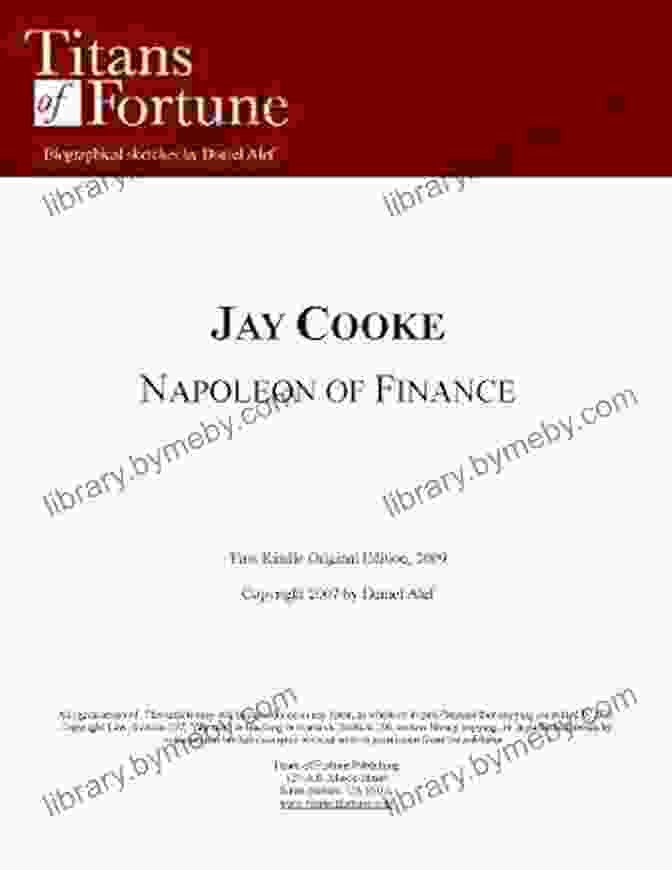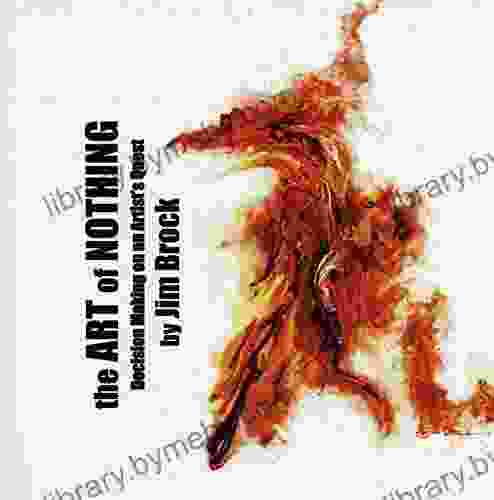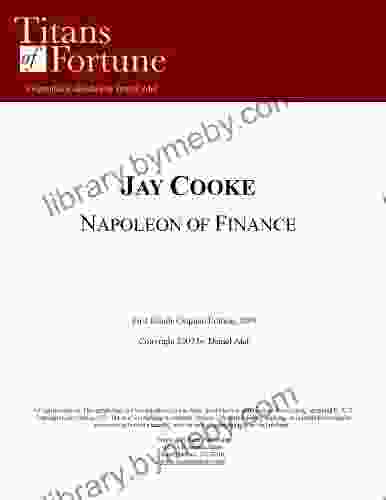Jay Cooke: The Napoleon of FinanceThe Man Who Shaped the American Economy


In the annals of American finance, the name Jay Cooke stands tall as a visionary leader and financial titan. Dubbed the "Napoleon of Finance" for his audacious financial strategies and unwavering determination, Cooke played a pivotal role in shaping the economic landscape of the United States. From his humble beginnings to his rise as one of the most influential financiers of his time, Cooke's life story is a testament to the power of ambition, innovation, and financial acumen.
5 out of 5
| Language | : | English |
| File size | : | 187 KB |
| Text-to-Speech | : | Enabled |
| Screen Reader | : | Supported |
| Enhanced typesetting | : | Enabled |
| Word Wise | : | Enabled |
| Print length | : | 6 pages |
| Lending | : | Enabled |
From Humble Beginnings to Financial Luminary
Jay Cooke was born in Sandusky, Ohio, in 1821, into a modest family of Quaker farmers. Despite his humble upbringing, Cooke possessed an unyielding determination and a keen interest in finance. At a young age, he began working as a clerk in a local bank, where he quickly demonstrated his aptitude for numbers and financial matters. His exceptional skills soon caught the attention of his superiors, who recognized his potential and promoted him rapidly through the ranks.
By the mid-1840s, Cooke had established his own banking firm in Philadelphia, which quickly gained a reputation for its financial expertise and integrity. Cooke's innovative banking practices and his ability to secure funding for major infrastructure projects, such as railroads and canals, earned him widespread recognition and respect within the financial community.
Financing the Civil War: Cooke's Moment of Triumph
Cooke's reputation as a financial wizard reached its peak during the American Civil War. In 1861, as the Union struggled to finance its war effort, President Abraham Lincoln turned to Cooke for assistance. Cooke devised a daring plan to sell government bonds directly to the American public, bypassing the traditional banking system. Through a series of patriotic rallies and speeches, Cooke rallied the nation to invest in the war effort, raising an unprecedented amount of funds.
Cooke's efforts played a crucial role in ensuring the Union's victory in the Civil War. His innovative financing strategies not only provided the necessary funds to Free Download weapons, supplies, and equipment but also boosted the morale of the Union troops and instilled confidence in the government's ability to prevail. For his invaluable contributions, Cooke was hailed as a national hero and became known as the "Financier of the Civil War."
Railroad Development and the Transformation of the American Economy
In addition to his role in financing the Civil War, Cooke also played a pivotal role in the development of the American railroad system. He recognized the transformative potential of railroads, and he invested heavily in the construction of new lines throughout the country. Cooke's financial backing and expertise helped to connect major cities, facilitate the transportation of goods and people, and fuel the growth of the American economy.
Cooke's railroad investments extended beyond the United States. He also played a key role in the construction of the Canadian Pacific Railway, which spanned the vast expanse of Canada and connected the Atlantic and Pacific coasts. Cooke's vision and financial acumen helped to create a transportation network that transformed the economic and social fabric of North America.
The Rise and Fall of a Financial Empire
At the height of his career, Jay Cooke was one of the most powerful and influential men in the United States. His financial empire encompassed banks, railroads, and a vast network of investments. However, the financial crisis of 1873, known as the Panic of 1873, dealt a devastating blow to Cooke's empire. Overextended and heavily leveraged, Cooke's banks failed, and he was forced to declare bankruptcy.
The collapse of Cooke's empire sent shockwaves through the American economy and left a lasting legacy. The Panic of 1873 led to a prolonged period of economic depression, and it highlighted the dangers of excessive speculation and unchecked financial growth. Despite his financial setbacks, Cooke's contributions to the American economy and his legacy as a financial innovator remain undeniable.
Jay Cooke's Lasting Legacy
Jay Cooke's influence extended far beyond the realm of finance. He was a philanthropist, an art collector, and a patron of the arts. He founded the Cooke Institute, a technical school for boys, and he donated generously to various educational and charitable causes.
Cooke's legacy can be seen in the enduring institutions he helped to create. The Northern Pacific Railroad, which he played a key role in financing, remains a major transportation artery in the United States. The Cooke Collection at the Smithsonian Institution houses a vast collection of art and artifacts assembled by Cooke, showcasing his passion for collecting and his appreciation for beauty.
Jay Cooke's life and career are a testament to the transformative power of ambition, innovation, and financial acumen. From his humble beginnings as a bank clerk to his rise as the "Napoleon of Finance," Cooke left an indelible mark on the American economy and society. His contributions to railroad development, war financing, and philanthropy continue to resonate today, shaping the fabric of the United States and inspiring generations of entrepreneurs and financiers.
5 out of 5
| Language | : | English |
| File size | : | 187 KB |
| Text-to-Speech | : | Enabled |
| Screen Reader | : | Supported |
| Enhanced typesetting | : | Enabled |
| Word Wise | : | Enabled |
| Print length | : | 6 pages |
| Lending | : | Enabled |
Do you want to contribute by writing guest posts on this blog?
Please contact us and send us a resume of previous articles that you have written.
 Book
Book Novel
Novel Page
Page Chapter
Chapter Text
Text Story
Story Genre
Genre Reader
Reader Library
Library Paperback
Paperback E-book
E-book Magazine
Magazine Newspaper
Newspaper Paragraph
Paragraph Sentence
Sentence Bookmark
Bookmark Shelf
Shelf Glossary
Glossary Bibliography
Bibliography Foreword
Foreword Preface
Preface Synopsis
Synopsis Annotation
Annotation Footnote
Footnote Manuscript
Manuscript Scroll
Scroll Codex
Codex Tome
Tome Bestseller
Bestseller Classics
Classics Library card
Library card Narrative
Narrative Biography
Biography Autobiography
Autobiography Memoir
Memoir Reference
Reference Encyclopedia
Encyclopedia P J Nichols
P J Nichols Michael Pewtherer
Michael Pewtherer Will Osborne
Will Osborne Marjorie Kelly
Marjorie Kelly Robert Khayat
Robert Khayat Steve Erickson
Steve Erickson Stephen M Silverman
Stephen M Silverman Krystal Kelly
Krystal Kelly Monroe Ariel
Monroe Ariel Ruth Stotter
Ruth Stotter Kristen Mccurry
Kristen Mccurry Yvette Durazo
Yvette Durazo Richard Twiss
Richard Twiss Harold Pinter
Harold Pinter Samuel N Rosenberg
Samuel N Rosenberg Skywatcher Press
Skywatcher Press Mary Blewitt
Mary Blewitt Natalie Rhodes
Natalie Rhodes Susan Rice
Susan Rice Roderick J Fraser Jr
Roderick J Fraser Jr
Light bulbAdvertise smarter! Our strategic ad space ensures maximum exposure. Reserve your spot today!
 Leo MitchellFollow ·7.1k
Leo MitchellFollow ·7.1k Preston SimmonsFollow ·12.6k
Preston SimmonsFollow ·12.6k Bryan GrayFollow ·6.5k
Bryan GrayFollow ·6.5k Herbert CoxFollow ·15.3k
Herbert CoxFollow ·15.3k Luke BlairFollow ·2.9k
Luke BlairFollow ·2.9k Ethan GrayFollow ·4.2k
Ethan GrayFollow ·4.2k Ivan TurgenevFollow ·14.7k
Ivan TurgenevFollow ·14.7k Clinton ReedFollow ·18.4k
Clinton ReedFollow ·18.4k

 Clay Powell
Clay PowellDiscover the Enigmatic Beauty and Profound Meaning in...
An Exploration of Emptiness, Fulfillment,...

 Brenton Cox
Brenton CoxThe Life and Times of the Woman Who Changed Abortion: The...
Norma McCorvey, the woman known...

 Darius Cox
Darius CoxBest 60 Short Hairstyles For Women With Thick Hair: A...
Embracing the beauty of...

 John Parker
John ParkerThe Healthy Pregnancy Book: Your Essential Guide to a...
Pregnancy is a...
5 out of 5
| Language | : | English |
| File size | : | 187 KB |
| Text-to-Speech | : | Enabled |
| Screen Reader | : | Supported |
| Enhanced typesetting | : | Enabled |
| Word Wise | : | Enabled |
| Print length | : | 6 pages |
| Lending | : | Enabled |
















